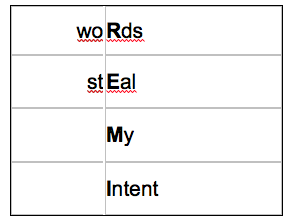Background
On #rhizo14 today, @teachnorthern asked for permission (not actually needed) to use the post https://francesbell.wordpress.com/2014/01/26/dimensions-of-power-knowledge-and-rhizomatic-thinking/ with teacher training students. I agreed and offered her a student activity that I had used over several years with Masters students who were starting to look at theories of power and how they might be applied in practice.
I offered to share this with her so thought I would publish it here. If you want to use this sheet (feel free to adapt) , you may wish to remove the text in square brackets []
In-class exercise –Power Lecture
- Vote on statements – agree or disagree
- Students have power over teachers
- Teachers have power over students
[I asked them for examples after a short period to discuss amongst themselves . They could think of lots of examples of the second (many relating to Turnitin) but the first one was more challenging.]
2. Read extract below.
3. Discuss with your neighbour
- Value of relational view of power in understanding scenario below
- ONE good example of relational nature of power
4. Be prepared to share with class
Example from Frances Bell’s Blog
What I meant by seeing power as relational was that:
- rather than describing power relations between A and B (I was thinking people here) as A has power over B
- we could describe these relations by saying how each of A and B affect and are affected by the (power) relations between them
(Health warning; although I was once a secondary school Maths teacher, my experience is a little out of date)
So for example with students and teachers in a hypothetical class
T(eacher) instructs students that Pi = 3.142 when teaching a class on finding the area of a circle.
S(tudent )1 accepts that and uses that value in his calculation. He accepts the knowledge of Pi from the teacher without question
S2 spends a little time researching Pi and discovers that 3.142 is an approximation. In her homework answers, she explains why she has chosen to use a value of Pi to 10 decimal places, whilst still recognising that her answer is still an approximation, but a better one than she would have achieved by using 3.142.
Scenario A
T gives slightly higher mark to S1 than S2. S1 and S2 compare notes, and both decide that T has missed an opportunity to share something interesting with the class. T goes down in estimation of S1 and S2, who are getting confirmed in their view that school maths is pretty boring. S2 thinks that she won’t bother to research around the subject in future but use her internet skills for learning about stuff within her control.
Scenario B
T gives top marks to S1 and S2, and uses the opportunity to highlight S2’s research to the class, going on to talk about the provisional nature of knowledge, the value of estimation (depending on context of problem) and the opportunity for students to challenge working assumptions. All students have opportunity to extend on basic knowledge from instruction, they see resourceful behaviour being recognised, and S2’s work is validate by T, as well as being enjoyable in its own right. T is seen (by some students at least) as someone who recognises that knowledge is open to question, and is not threatened by challenges from students.
A relational view of power would go beyond the question:
In which scenario does T have more power over the students?
The question wouldn’t really make sense. A better question might be:
In which scenario do students have more effective agency? If student goals were passing standard tests, the answer might be Scenario A. If student goals were learning and having fun, then maybe B.
It’s pretty complicated thinking about knowledge, power, agency and context, and for these scenarios the important power relations may go way beyond the classroom context – institution, parents, government, etc.
[We would finish with a discussion of whether the scenarios resonated with them and what difference this might make to their learning]
Resources
https://francesbell.wordpress.com/2014/01/26/dimensions-of-power-knowledge-and-rhizomatic-thinking/
http://stevenlukes.files.wordpress.com/2012/06/2-power-for-encyclopedia.pdf
· Creative Commons License
Frances Bell’s Blog by Frances Bell is licensed under aCreative Commons Attribution-NonCommercial 3.0 Unported License.
Based on a work at www.francesbell.wordpress.com.


